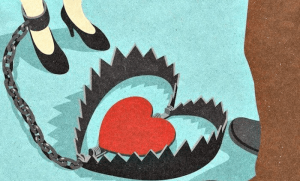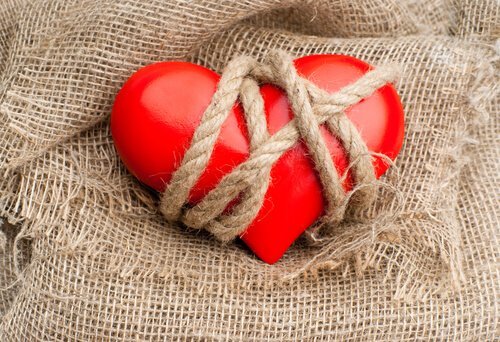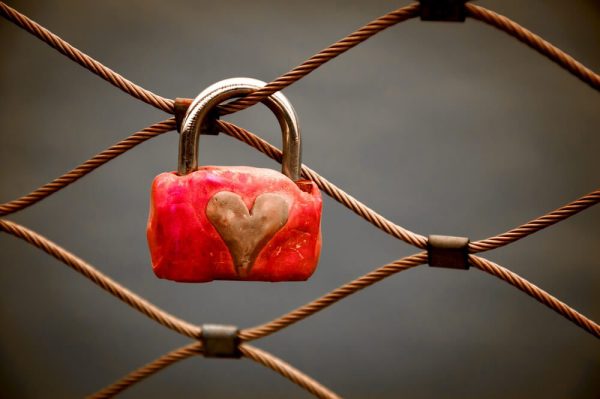Relationship Addicts: Slaves to Emotional Attachment


Written and verified by the psychologist Valeria Sabater
Lovesickness is real, and its victims number in the thousands. There are relationship addicts who push aside their self-respect and dignity every day in exchange for toxic and destructive attachments. These people are characterized by obvious emotional immaturity that quickly transforms love into something bitter and harmful.
Relationship addicts never form healthy, happy connections; they find themselves in hostage situations. In day-to-day life these couples trap themselves in a cycle of suffering where they’re constantly sacrificing their values, morals, emotions, and principles.
Therefore, as usually happens with any other kind of addiction, it’s not easy to break a habit fueled by ferocious need: the need to be a part of someone, to put yourself at their feet and feel completed, fortified, successful. When the brain gets used to this dynamic, the “toxic love” becomes like a poison drug. It becomes very difficult to break the cycle.

How to identify a relationship addict
Relationship addicts are like anyone else. They have careers, interests, likes, passion, virtues, and defects. There’s a simple point we want to make: love addiction does not discriminate based on age or status, and it can arise in any of us without us realizing it. Without us noticing, maybe, our current relationships could have obviously addictive qualities.
Now, if we delve into what builds our romantic relationships, we might realize a few things. Firstly, there are two kind of relationship addicts. The first describes those who always need a boyfriend or girlfriend. These people’s thoughts can be summarized with: “you don’t fall in love with who you love, but who you can love. The important part is loving someone, having someone.”
The second kind of relationship addict acts like a bear trap. The moment they enter into a relationship, they are hooked, stuck in it. They can’t leave even if it’s harmful, even if it violates the very foundations of their dignity. Thus, the two types share characteristics: fear of loneliness, lack of clear self-identity, lack of self-esteem, and constant search for affection and validation from others. They both resort to extreme behaviors to save the relationship at all costs, and they get extreme anxiety if it seems like anything isn’t going perfectly.

All of these symptoms exhibited by relationship addicts have almost the same patterns as symptoms for substance abuse. The brain needs this dose of obsessive attachment, this “nutrient” our partner provides, even in a cheating, toxic relationship. This way, little by little, we end up incapable of controlling our own behavior. It may even reach extremes: anxiety attacks, eating disorders, suicide attempts…
What can relationship addicts do to break the cycle?
It’s very difficult to stop smoking if you keep holding the cigarette in your hand. In the same vein, it’s hard to leave an addictive relationship if we are still feeding ourselves the same ideas. This emotional nicotine destroys our self-love.
Some go to therapy complaining of always falling in love with the wrong people, the most “hurtful” people, they insist. It’s as if their brains are programmed to fall into the same toxic traps. Instead of learning from the past and from their bad experiences, they find themselves in the same situation over and over again. Why does this happen? Why is it so difficult for relationship addicts to stop these behaviors?
Basically, because they still haven’t learned the repercussions of this emotional dependency. Because they’re vulnerable, with low self-esteem and a need for affection, even if it’s unhealthy. They still need to work out some key issues for themselves. Here are some of those issues.
How to face my emotional dependency:
- It’s imperative to recognize one’s own relationship addiction and its consequences. Be honest with yourself and admit it when everything isn’t okay. Open your eyes and accept reality.
- You must understand that the emotional and physical tendon of all relationships is respect and self-respect. Without those two, we don’t deserve to love or someone to love us, because when we don´t respect something it goes to ruin and breaks apart.
- Likewise, there’s another vital aspect to understand. Emotional attachment can manifest as the obsessive need to have someone by our side no matter the price, or who it might hurt. Extreme attachment corrupts us and degrades us. It destroys our potential.
- Oftentimes, we treat our wants like needs. Behind the phrase “I want to be loved” we hide other desires that we must explore and understand. If we crave recognition, validation, or defense from loneliness at all costs, we don’t need to find a hostage to check those boxes. We need to be the one to address these problems first.

Relationship addicts have to take the plunge and ask themselves a simple question: do I want harmful love, or emotional health? If they choose the second, there’s only one path left to take. It seems simple at first glance but requires a lot of personal work. That path involves working on your self-esteem, and on building a stronger, braver sense of dignity – one that will liberate you and help you form rich connections. Instead of hostages, there will be free people choosing to build something together.
Lovesickness is real, and its victims number in the thousands. There are relationship addicts who push aside their self-respect and dignity every day in exchange for toxic and destructive attachments. These people are characterized by obvious emotional immaturity that quickly transforms love into something bitter and harmful.
Relationship addicts never form healthy, happy connections; they find themselves in hostage situations. In day-to-day life these couples trap themselves in a cycle of suffering where they’re constantly sacrificing their values, morals, emotions, and principles.
Therefore, as usually happens with any other kind of addiction, it’s not easy to break a habit fueled by ferocious need: the need to be a part of someone, to put yourself at their feet and feel completed, fortified, successful. When the brain gets used to this dynamic, the “toxic love” becomes like a poison drug. It becomes very difficult to break the cycle.

How to identify a relationship addict
Relationship addicts are like anyone else. They have careers, interests, likes, passion, virtues, and defects. There’s a simple point we want to make: love addiction does not discriminate based on age or status, and it can arise in any of us without us realizing it. Without us noticing, maybe, our current relationships could have obviously addictive qualities.
Now, if we delve into what builds our romantic relationships, we might realize a few things. Firstly, there are two kind of relationship addicts. The first describes those who always need a boyfriend or girlfriend. These people’s thoughts can be summarized with: “you don’t fall in love with who you love, but who you can love. The important part is loving someone, having someone.”
The second kind of relationship addict acts like a bear trap. The moment they enter into a relationship, they are hooked, stuck in it. They can’t leave even if it’s harmful, even if it violates the very foundations of their dignity. Thus, the two types share characteristics: fear of loneliness, lack of clear self-identity, lack of self-esteem, and constant search for affection and validation from others. They both resort to extreme behaviors to save the relationship at all costs, and they get extreme anxiety if it seems like anything isn’t going perfectly.

All of these symptoms exhibited by relationship addicts have almost the same patterns as symptoms for substance abuse. The brain needs this dose of obsessive attachment, this “nutrient” our partner provides, even in a cheating, toxic relationship. This way, little by little, we end up incapable of controlling our own behavior. It may even reach extremes: anxiety attacks, eating disorders, suicide attempts…
What can relationship addicts do to break the cycle?
It’s very difficult to stop smoking if you keep holding the cigarette in your hand. In the same vein, it’s hard to leave an addictive relationship if we are still feeding ourselves the same ideas. This emotional nicotine destroys our self-love.
Some go to therapy complaining of always falling in love with the wrong people, the most “hurtful” people, they insist. It’s as if their brains are programmed to fall into the same toxic traps. Instead of learning from the past and from their bad experiences, they find themselves in the same situation over and over again. Why does this happen? Why is it so difficult for relationship addicts to stop these behaviors?
Basically, because they still haven’t learned the repercussions of this emotional dependency. Because they’re vulnerable, with low self-esteem and a need for affection, even if it’s unhealthy. They still need to work out some key issues for themselves. Here are some of those issues.
How to face my emotional dependency:
- It’s imperative to recognize one’s own relationship addiction and its consequences. Be honest with yourself and admit it when everything isn’t okay. Open your eyes and accept reality.
- You must understand that the emotional and physical tendon of all relationships is respect and self-respect. Without those two, we don’t deserve to love or someone to love us, because when we don´t respect something it goes to ruin and breaks apart.
- Likewise, there’s another vital aspect to understand. Emotional attachment can manifest as the obsessive need to have someone by our side no matter the price, or who it might hurt. Extreme attachment corrupts us and degrades us. It destroys our potential.
- Oftentimes, we treat our wants like needs. Behind the phrase “I want to be loved” we hide other desires that we must explore and understand. If we crave recognition, validation, or defense from loneliness at all costs, we don’t need to find a hostage to check those boxes. We need to be the one to address these problems first.

Relationship addicts have to take the plunge and ask themselves a simple question: do I want harmful love, or emotional health? If they choose the second, there’s only one path left to take. It seems simple at first glance but requires a lot of personal work. That path involves working on your self-esteem, and on building a stronger, braver sense of dignity – one that will liberate you and help you form rich connections. Instead of hostages, there will be free people choosing to build something together.
This text is provided for informational purposes only and does not replace consultation with a professional. If in doubt, consult your specialist.







